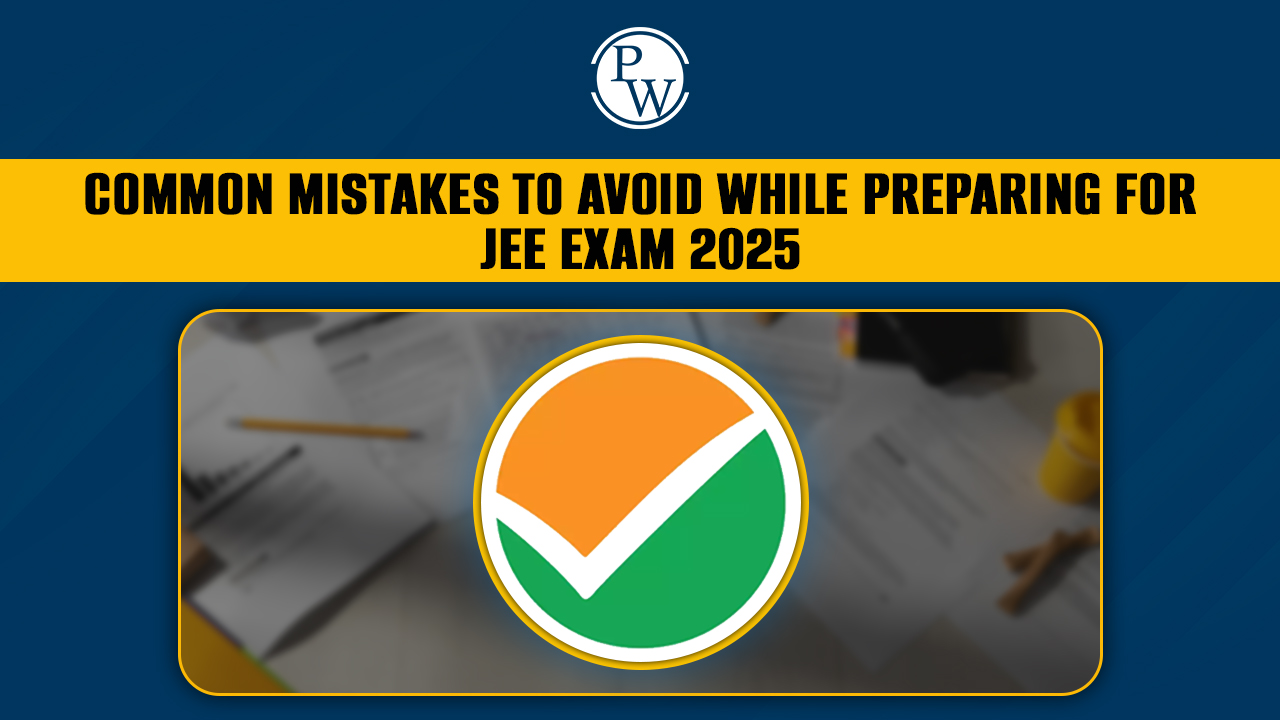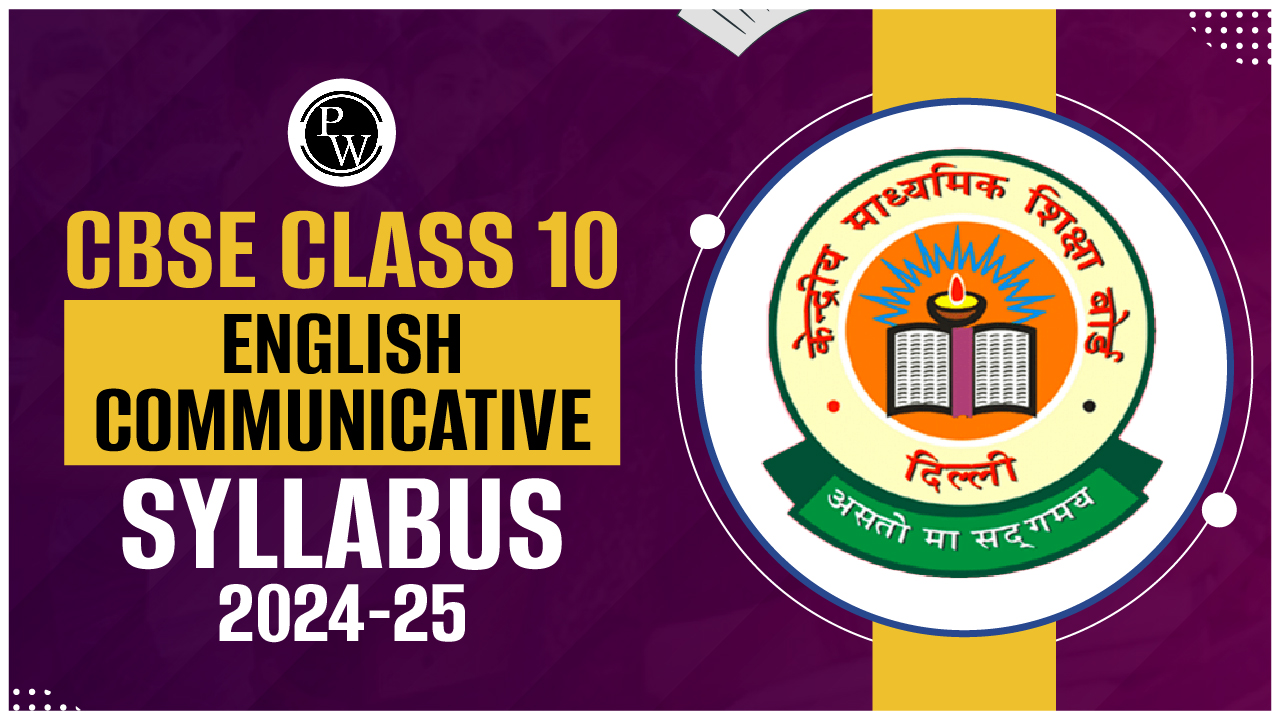Common Mistakes to Avoid While Preparing for JEE Exam 2025

Common Mistakes to Avoid While Preparing for JEE 2025:- The JEE Main 2025 exam dates have been announced, with the first session starting on 24th January 2025, and the second session planned for April 2025. With the exam dates coming closer, it's natural for students to feel the pressure. While most aspirants focus entirely on studying, it's equally important to stay mindful of certain mistakes that can impact your performance, especially on the exam day.
Simple errors like filling in wrong details on the OMR sheet, forgetting essential documents, or mismanaging time can turn a well-prepared attempt into a missed opportunity. These mistakes often happen due to stress or lack of awareness. To ensure you perform your good, it's crucial to not only prepare thoroughly but also be alert and organised during the exam. Check out the article below to learn about the most common mistakes in exams along with how to prepare for JEE.
Check out: JEE Previous Year Papers
Common Mistakes to Avoid While Preparing for JEE 2025
1. Forgetting Important Documents
One of the most common mistakes students make is forgetting to arrange their required documents before the exam day. Admit cards, ID proofs, and stationery must be packed at least one day in advance. Rushing to find these on the morning of the exam not only creates unnecessary stress but may also lead to missing the reporting time. To avoid this, make a checklist of all the items you’ll need for the exam and tick them off once packed.
2. Skipping Test Series
Test Series are an essential part of your JEE preparation strategy, yet many students neglect them. These JEE Test Series simulate the real exam environment and help you practise time management. Aim to take at least 10–15 full-length mock tests, and review them thoroughly to identify and correct your mistakes.
3. Poor Time Management
Effective time management is a crucial step of how to prepare for JEE Mains. Without a proper schedule, it’s easy to spend too much time on one subject while neglecting others. Create a detailed timetable that allocates time for all three subjects – Physics, Chemistry, and Mathematics – based on their weightage and your proficiency in each. Additionally, practise solving questions within a fixed time limit to improve speed and accuracy.
4. Overlooking NCERT Books
NCERT textbooks are the foundation of JEE preparation, especially for Chemistry. Many students make the mistake of prioritising advanced reference books and ignoring NCERTs, but this approach can backfire. The JEE question paper often includes direct or concept-based questions from NCERT content. Cover these books thoroughly before moving to higher-level materials.
5. Avoiding Weak Topics
A common mistake in JEE exam preparation is focusing too much on strong areas while avoiding weak ones. Although it’s more preferable to study more on topics you’re already good at, neglecting your weaknesses could result in missed marks. Identify your weaker areas early in your preparation, and dedicate extra time to mastering them.
6. Using Too Many Resources
It’s easy to get overwhelmed by the abundance of study materials available for JEE exam preparation. Referring to too many books or resources can lead to confusion and waste precious time. Instead, stick to a few reliable sources, such as NCERT textbooks, or Physics Wallah’s JEE Books, and previous year question papers.
7. Ignoring Health and Well-being
During the intense JEE exam preparation phase, students often sacrifice sleep, skip meals, or cut down on physical activity. This can have serious consequences for your focus, energy levels, and overall performance. Maintaining a healthy lifestyle is as important as studying. Eat balanced meals, exercise regularly, and ensure you’re getting 7–8 hours of sleep every night.
8. Being Overconfident
Confidence is essential, but overconfidence can be harmful. Some students stop revising after feeling they’ve mastered a topic, only to realise later they’ve forgotten key concepts. Regular revision is critical, no matter how confident you feel about a subject. Take time to revisit topics, practice problems, and clarify doubts to ensure you’re fully prepared.
9. Not Reading Exam Instructions Carefully
Another most common mistake in the exam is skipping over instructions. The JEE exam format is strict, and small errors like filling incorrect details, marking answers in the wrong section, or misunderstanding the question pattern can affect your score. Always take a moment to read the instructions carefully before starting the paper.
10. Panicking on Exam Day
Exam day stress is natural but letting it take over can lead to errors and poor performance. Many students panic when they encounter tough questions and lose their focus. Remember that JEE is designed to challenge you, and it’s okay to skip difficult questions and return to them later. Practice relaxation techniques like deep breathing to keep your nerves in check. Staying calm and confident is half the battle won.
Check out: JEE Revision Books
How to Prepare for JEE Mains?
-
Understand the JEE Mains Exam Pattern and Syllabus
Before starting your JEE exam preparation, understand the exam structure. JEE Mains includes Physics, Chemistry, and Mathematics, with 90 questions in total (30 per subject). Each correct answer awards 4 marks, while incorrect answers deduct 1 mark. Familiarise yourself with the NCERT syllabus for Classes 11 and 12 and divide it into smaller, manageable sections. -
Important Topics for JEE Mains
Focusing on key topics can maximise your score. For Physics, concentrate on Mechanics, Electrodynamics, and Modern Physics. In Chemistry, cover Physical Chemistry (Thermodynamics, Chemical Kinetics), Organic Chemistry (Reaction Mechanisms), and Inorganic Chemistry (Periodic Table, Coordination Compounds). For Mathematics, focus on Algebra, Calculus, and Coordinate Geometry. -
Create a Study Plan
A well-structured study plan is essential. Dedicate mornings to theory-heavy subjects like Chemistry, afternoons to problem-solving for Physics or Mathematics, and evenings to revision. Set weekly goals to cover at least 3–5 topics, with one day reserved for revising weak areas. -
Practise with Mock Tests and Previous Year Papers
Regular mock tests and solving past papers are crucial for JEE Mains preparation. They help you understand question patterns, improve time management, and identify weak areas. Solve at least 10–15 previous year question papers to gain confidence. -
Time Management During the Exam
Manage your time wisely during the exam. Allocate one hour per subject and start with the easier questions. Avoid spending too much time on difficult problems to ensure you attempt maximum questions. -
Revise Regularly
Frequent revision helps retain concepts and formulas. Maintain a notebook for important formulas, shortcuts, and key concepts. Revise this notebook daily, especially in the months guiding up to the exam.
Read More: JEE Main Marks vs Percentile 2025
JEE Main Exam 2025 FAQs
Q1: What are the most important topics for JEE Mains?
Ans. For Physics, focus on Mechanics, Modern Physics, and Electrodynamics. In Chemistry, prioritise Physical Chemistry (Thermodynamics, Chemical Kinetics), Organic Chemistry (Reaction Mechanisms), and Inorganic Chemistry (Periodic Table, Coordination Compounds). In Mathematics, give extra attention to Algebra, Calculus, and Coordinate Geometry.
Q2: How much time should I study daily for JEE Mains?
Ans. Aim for 6–8 hours of focused study daily. Divide your time among learning new concepts, solving problems, revising, and practising mock tests. Quality matters more than quantity, so focus on understanding concepts deeply.
Q3: Is NCERT enough for JEE Mains preparation?
Ans. NCERT books are crucial, especially for Chemistry, but for Physics and Mathematics, supplement your preparation with advanced books like PYQ, sample papers and other reference materials.
Q4: How do I manage time during the JEE Mains exam?
Ans. Allocate one hour per subject. Start with easier questions to build confidence and then move to tougher ones. Avoid spending too much time on a single question. Mark uncertain answers for review if time permits.
Q5: How important are mock tests and previous year papers?
Ans. Mock tests and past papers are essential for understanding question patterns and improving speed and accuracy. Practise at least one mock test weekly and solve 10–15 previous year question papers to identify and work on weak areas.











